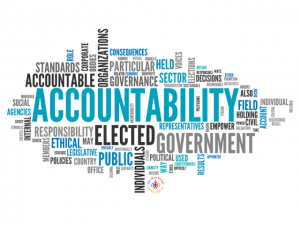Beyond budgeting or project execution, one of the essential responsibilities of any government to its citizens is to be financially accountable and transparent. Citizens are critical stakeholders in any government, and one viable way to reassure them that the government is citizen-oriented is to have a transparent and accountable government. This enables the citizens to keep track of government activities and keep the officials on their toes regarding their electoral promises.

In Nigeria, the financial dealings of government agencies and parastatals are often concealed. Unlike the private establishments where stakeholders are constantly fed with financial disclosures, or at least at an Annual General Meeting of the establishment, the public sector is still lagging in this aspect.
Hence, the adoption of digital platforms is essential in creating impact and delivery with an unbridled flow of information. Even though many government agencies have online platforms, the question that comes to mind is, does the Nigerian government at all tiers adopt these platforms to disclose financial transactions? And when they eventually do, which is rare, do they make full disclosure of the financial activities?
A government with adequate disclosure of its financial activities would trust among the citizens who are stakeholders and as well enable them to analyse the government performance as ask relevant questions to ensure accountability.
Globally, governments have keened into the concept of e-government with the adoption of ICT tools in public administration to improve public services and strengthen citizen support. In Nigeria, however, this development has not been fully keyed into to enhance accountability and good governance.
As e-Government aids interaction between the government and the citizens, its full implementation in Nigeria would go a long way in achieving transparency, accountability and efficiency in governance, all of which would help to achieve better governance and ensure well being of the general populace.
Many citizens are interested in how the nation’s commonwealth is expended, just like the stakeholders of a private establishment are much interested in the performance report of their establishment during the Annual General Meeting. In Nigeria presently, barely any citizen has access to the financial account of the National Assembly; most dealings are concealed in secrecy. Several government agency and parastatals either have a dysfunctional website or lack of online presence at all.
A survey report by the United Nations on e-governance ranked Nigeria 162nd out of 193 countries regarding their e-governance status. This is because most government parastatals either fail to publish their dealings report online, or the reports are not detailed, and one can barely make any meaning out of it.
Hence, a government audited financial report is a stewardship report that avails how the nation commonwealth or citizens money is allocated and extended should be made available for the masses. Relevant government bodies such as the Financial Reporting Council should endeavour to make it mandatory for ministries and other government agencies to report their annual audited account on their websites for citizens access. This is a global practice that helps to enhance government transparency and accountability.